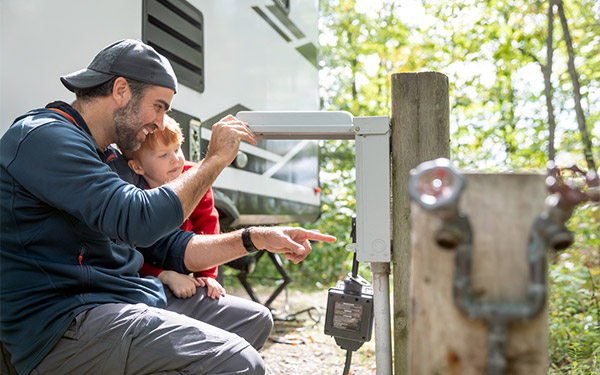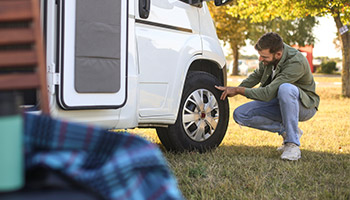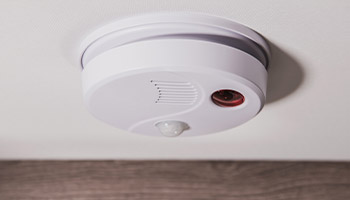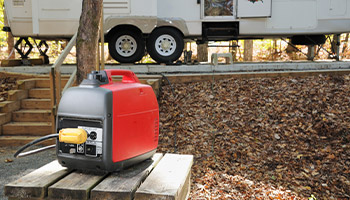8 RV Safety Devices You Don’t Want to Adventure Without

If you’re an avid RVer, you know life on the road can be unpredictable. No matter how much you prepare for a trip, a sudden storm or road disruption can quickly cause you to reevaluate your plans. Regardless of how often you travel in your RV, having systems in place to handle sudden changes can keep you from facing a dangerous situation empty-handed. To make your travels hassle-free, we put together this list of RV safety devices and emergency equipment every RVer should have on hand. Ready, set, prepare!
RV Safety Devices to Always Have on Hand
1. Fire Extinguisher
Starting our list of RV safety devices is an item every RVer should have—and know where it is—at all times: a fire extinguisher. No matter your travel style, having a fire extinguisher is critical to putting out hazards before they cause lasting damage.
When we are traveling in our RVs, we often visit locations that are off the beaten path. Although these destinations are worth visiting, they are typically a long drive away from emergency services. Keep yourself and your RV protected by always having an extinguisher and knowing its location.
2. Tire Pressure Monitoring System

Due to the added weight of an RV, tire blowouts are much more common on RVs than on standard vehicles. Not only is a tire blowout stressful, but it can also lead to a dangerous accident.
When traveling in an RV, monitoring your tire pressure is vital. Although simple tire gauges can do the job in a pinch, they don’t allow you to have a live reading while your rig is in motion. We recommend having a tire pressure monitoring system to monitor your tires at all times. A tire pressure monitoring system won’t prevent a blowout, but will alert you when your tires are low in pressure or fail. In such situations, having the chance to react quickly can mean the difference between a roadside fix and a costly accident.
3. Roadside Safety Kit
What makes RV travel so great is the ability to venture towards areas away from the hustle and bustle of city life. However, because of this, having a roadside emergency kit is an RV safety device every rig should have on hand.
Despite your best efforts, you never know when you may find yourself on the side of the road waiting for assistance. Whether it’s a tire blowout, a faulty engine, or an unexpected detour, having an emergency kit with a few basics can keep you comfortable (and safe) in a pinch. You’ll find no shortage of suggestions when building an emergency kit, but we recommend carrying some of these essential components:
- Jumper cables
- Reflective traffic triangles and road flares
- Tow rope
- First aid kit
- Emergency poncho, blanket, and change of clothes
- Duct tape and a basic tool kit
- Flashlight (with backup batteries)
- Work gloves
- Canned food and bottled water
- Pen and paper
4. Surge Protector
A surge protector is a must-have RV safety device that will prevent you from damaging any of your rig’s electronics while hooked up to a campsite’s power. You don’t technically need a surge protector, as you can connect your RV directly to the power pole. However, connecting to shore power without a surge protector can heavily damage your RV’s electrical system in the event of a power surge. Keep in mind that RV surge protectors vary from standard surge protectors that you’ll find in a home.
5. Smoke Alarms and Carbon Monoxide Detectors

A fire extinguisher is great, but it isn’t enough to fully protect your RV. Because RVs are tightly enclosed spaces, you’ll need to ensure you always have a clean air supply.
Harmful fumes such as carbon monoxide or smoke can build up while you aren’t aware or asleep. In these cases, a smoke alarm and a carbon monoxide detector are essential.
Note: although removing the battery from your smoke alarm when cooking inside your RV may be tempting, we recommend that you don’t. That way, you will prevent yourself from forgetting to put it back in.
6. Backup Camera
If you own a modern RV, it may already come equipped with a backup camera. However, if you don’t have one already installed, you’ll do yourself a favor by purchasing one. Sure, we all think we don’t need any extra help parking our rig, but due to their size, having an additional set of eyes while parking is always helpful.
We always recommend that you have someone outside of the rig help you back into a space, but in a hurry, a camera can be a worthy substitute.
7. A Propane Gas Stop
Many RVs come equipped with some form of propane-powered systems and appliances. Propane is an excellent fuel source that can be easily found, but it comes with its own risks. To protect yourself in the event of a leak, consider installing a propane gas stop in your rig.
Some RVs and tanks may already have these pre-installed, so be sure to refer to your owner’s manual to see if you need to add one or not. Regardless, a gas stop will ensure flow is cut off if it detects a leak or problem with your propane system.
8. A Battery Monitor and Backup Power

The last thing you want when RVing is to wake up on a travel day to a dead battery. If your RV doesn’t have a battery monitoring system on its dashboard, this is a must-purchase, especially if you are an avid boondocker. A good battery monitor will let you know how your battery is performing at all times, allowing you to change your electrical usage accordingly.
Even if you have a battery monitor on hand, it’s always wise to have additional power sources. Whether you utilize a solar panel system to generate electricity or rely on an external generator, there are plenty of compact options that don’t require an extensive setup. Be sure to visit our solar panel and generator guides to learn more about external power sources.
Keeping Your Rig Protected Anywhere You Go
When it comes to RVing, the easiest way to protect you from disaster is by having the proper RV insurance. Despite their size and durability, it’s easy for RVs to take on damage when out adventuring. Accidents can happen anytime, so protect your rig and assets with a customized RV policy that suits your needs. RV insurance isn’t a one-size-fits-all approach, as plenty of coverage types can apply to different kinds of travelers. To learn more about the RV insurance coverages that are right for you, give our specialists a call today at (866) 501-7335.
The information in this article is obtained from various sources and is offered for educational purposes. Furthermore, it should not replace manuals or instructions provided by the manufacturer or the advice of a qualified professional. No warranty or appropriateness for a specific purpose is expressed or implied.
